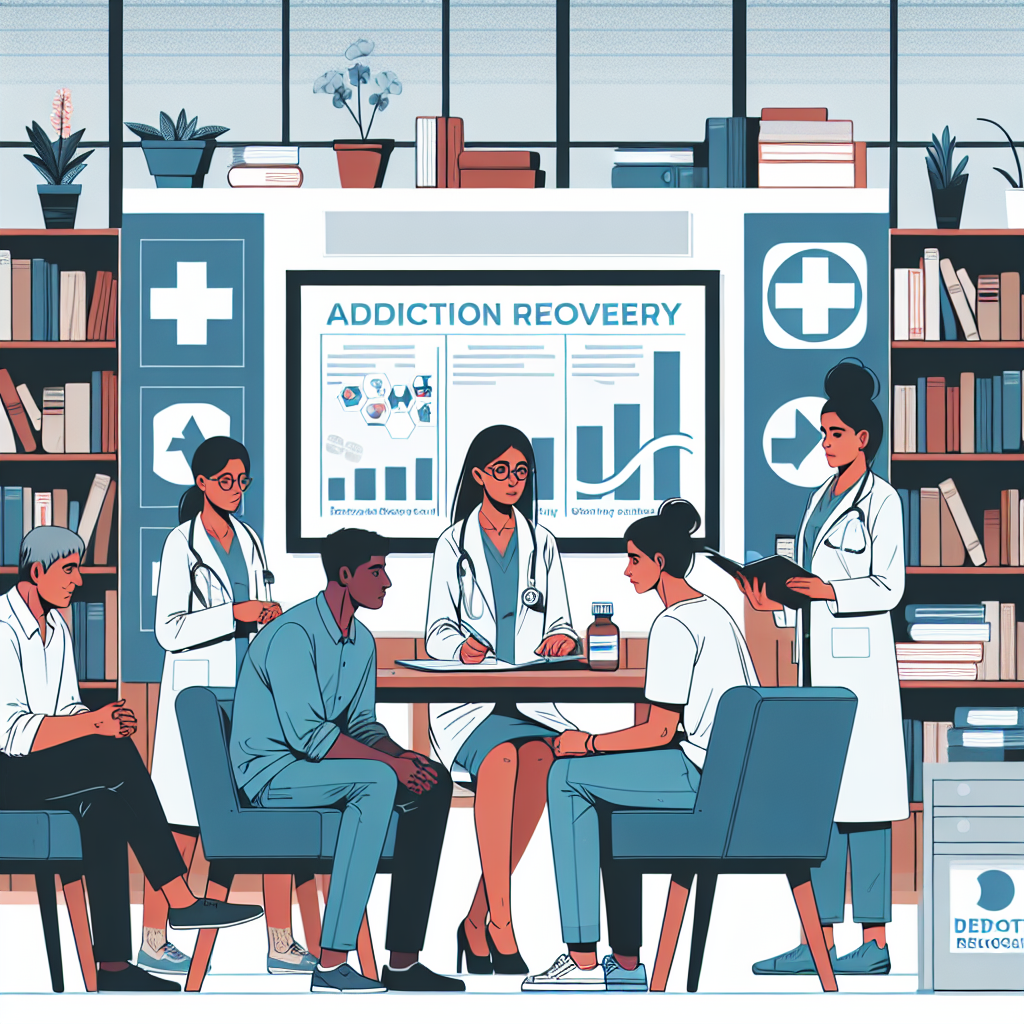-
Table of Contents

“Guiding You Through Withdrawal with Compassion and Expertise.”
Introduction
Addiction recovery services handle withdrawal symptoms through a combination of medical supervision, medication-assisted treatment, and supportive care. Medical professionals closely monitor individuals to manage and alleviate the physical and psychological symptoms associated with withdrawal. Medications such as methadone, buprenorphine, or benzodiazepines may be prescribed to reduce cravings and ease discomfort. Additionally, these services often provide counseling, therapy, and support groups to address the emotional and mental challenges of withdrawal, ensuring a comprehensive approach to recovery. This integrated strategy aims to create a safer and more manageable withdrawal process, ultimately supporting long-term sobriety and well-being.
Effective Strategies Used by Addiction Recovery Services to Manage Withdrawal Symptoms
Addiction recovery services play a crucial role in helping individuals overcome substance dependence, and one of the most challenging aspects of this journey is managing withdrawal symptoms. These symptoms can range from mild discomfort to severe physical and psychological distress, making it essential for recovery services to employ effective strategies to ensure the safety and well-being of those in their care. By understanding the multifaceted approach used by these services, we can appreciate the dedication and expertise required to guide individuals through this critical phase of recovery.
One of the primary strategies employed by addiction recovery services is the use of medically supervised detoxification. This process involves the careful monitoring of individuals by healthcare professionals who can administer medications to alleviate withdrawal symptoms and prevent complications. For instance, medications such as methadone or buprenorphine are often used to manage opioid withdrawal, while benzodiazepines may be prescribed to ease alcohol withdrawal symptoms. The goal of medically supervised detoxification is to provide a safe and controlled environment where individuals can begin their recovery journey with the least amount of discomfort possible.
In addition to medical interventions, addiction recovery services also emphasize the importance of psychological support during the withdrawal phase. Withdrawal symptoms can often include anxiety, depression, and intense cravings, which can be overwhelming for individuals. To address these challenges, recovery services offer counseling and therapy sessions that provide emotional support and coping strategies. Cognitive-behavioral therapy (CBT), for example, is a widely used approach that helps individuals identify and change negative thought patterns and behaviors associated with substance use. By addressing the psychological aspects of withdrawal, recovery services help individuals build resilience and develop healthier ways of coping with stress and triggers.
Another effective strategy used by addiction recovery services is the implementation of holistic and complementary therapies. These therapies, which include practices such as yoga, meditation, acupuncture, and massage, aim to promote overall well-being and reduce withdrawal symptoms naturally. For instance, yoga and meditation can help individuals manage stress and anxiety, while acupuncture has been shown to alleviate physical discomfort and cravings. By incorporating these holistic approaches into the recovery process, services provide individuals with a well-rounded and comprehensive support system that addresses both the mind and body.
Furthermore, addiction recovery services recognize the importance of a supportive community in managing withdrawal symptoms. Group therapy and peer support groups offer individuals the opportunity to connect with others who are going through similar experiences. This sense of camaraderie and shared understanding can be incredibly empowering and motivating. Hearing success stories and receiving encouragement from peers can instill hope and inspire individuals to persevere through the challenges of withdrawal. Additionally, family therapy sessions can help repair relationships and build a strong support network, which is essential for long-term recovery.
Lastly, addiction recovery services often provide education and resources to help individuals understand the withdrawal process and what to expect. Knowledge is a powerful tool, and by educating individuals about the symptoms and duration of withdrawal, services can help reduce fear and uncertainty. This information empowers individuals to take an active role in their recovery and make informed decisions about their treatment.
In conclusion, addiction recovery services employ a multifaceted approach to manage withdrawal symptoms effectively. Through medically supervised detoxification, psychological support, holistic therapies, community involvement, and education, these services provide individuals with the tools and resources they need to navigate the challenging withdrawal phase. By addressing both the physical and psychological aspects of withdrawal, recovery services inspire hope and resilience, guiding individuals towards a healthier and substance-free life.
The Role of Medical Supervision in Handling Withdrawal Symptoms During Addiction Recovery
Withdrawal symptoms are often the most daunting aspect of addiction recovery, presenting both physical and psychological challenges that can deter individuals from seeking help. However, the role of medical supervision in handling these symptoms is crucial, offering a beacon of hope and a structured pathway to recovery. Medical professionals are equipped with the knowledge and tools necessary to manage withdrawal symptoms effectively, ensuring that the process is as safe and comfortable as possible.
One of the primary ways medical supervision aids in handling withdrawal symptoms is through the use of medication-assisted treatment (MAT). Medications such as methadone, buprenorphine, and naltrexone can alleviate the severity of withdrawal symptoms and reduce cravings, making it easier for individuals to focus on their recovery journey. These medications are carefully administered and monitored by healthcare providers, ensuring that they are used safely and effectively. This approach not only mitigates the physical discomfort associated with withdrawal but also addresses the psychological aspects of addiction, providing a more holistic treatment plan.
In addition to medication, medical supervision involves continuous monitoring of the individual’s health status. Withdrawal can sometimes lead to severe complications, such as seizures, dehydration, or heart issues, which require immediate medical attention. By being under the care of medical professionals, individuals are assured that any adverse reactions will be promptly addressed. This constant monitoring provides a safety net, allowing individuals to navigate the withdrawal process with greater confidence and less fear.
Furthermore, medical supervision extends beyond the physical aspects of withdrawal. Emotional and psychological support is a critical component of addiction recovery. Medical professionals, including doctors, nurses, and therapists, work collaboratively to provide comprehensive care. They offer counseling and support groups, helping individuals to understand the root causes of their addiction and develop coping strategies for the future. This integrated approach ensures that individuals receive the emotional support they need, which is just as important as managing physical symptoms.
The environment in which withdrawal takes place also plays a significant role in the recovery process. Medical supervision often occurs in specialized facilities designed to provide a safe and supportive atmosphere. These facilities are equipped with the necessary resources to handle any complications that may arise, and they offer a structured routine that helps individuals to establish a sense of normalcy. The presence of trained staff around the clock provides reassurance and reduces the likelihood of relapse, creating an environment conducive to healing.
Moreover, the role of medical supervision in handling withdrawal symptoms is not limited to the initial stages of recovery. Follow-up care and ongoing support are essential to maintaining long-term sobriety. Medical professionals continue to monitor progress, adjust treatment plans as needed, and provide resources for continued support. This ongoing relationship helps individuals to stay on track and reinforces the commitment to a substance-free life.
In conclusion, the role of medical supervision in handling withdrawal symptoms during addiction recovery cannot be overstated. Through medication-assisted treatment, continuous health monitoring, emotional and psychological support, and a structured environment, medical professionals provide a comprehensive approach to managing withdrawal. This multifaceted support system not only alleviates the immediate challenges of withdrawal but also lays the foundation for a successful and sustained recovery. By placing their trust in medical supervision, individuals can embark on their recovery journey with hope and confidence, knowing that they are not alone in their fight against addiction.
Q&A
1. **Question:** What medications are commonly used in addiction recovery services to manage withdrawal symptoms?
**Answer:** Medications such as methadone, buprenorphine, and naltrexone are commonly used to manage withdrawal symptoms in opioid addiction, while benzodiazepines and anticonvulsants may be used for alcohol withdrawal.
2. **Question:** What non-pharmacological approaches do addiction recovery services use to handle withdrawal symptoms?
**Answer:** Non-pharmacological approaches include behavioral therapies, counseling, support groups, and holistic practices such as meditation, exercise, and nutritional support.
Conclusion
Addiction recovery services handle withdrawal symptoms through a combination of medical supervision, medication-assisted treatment, behavioral therapy, and supportive care. Medical professionals monitor patients to manage and alleviate physical symptoms, often using medications like methadone, buprenorphine, or benzodiazepines to reduce withdrawal severity. Behavioral therapies, such as cognitive-behavioral therapy (CBT) and counseling, address psychological aspects and help develop coping strategies. Supportive care, including hydration, nutrition, and emotional support, is also crucial. This comprehensive approach aims to ensure safety, reduce discomfort, and promote long-term recovery.



